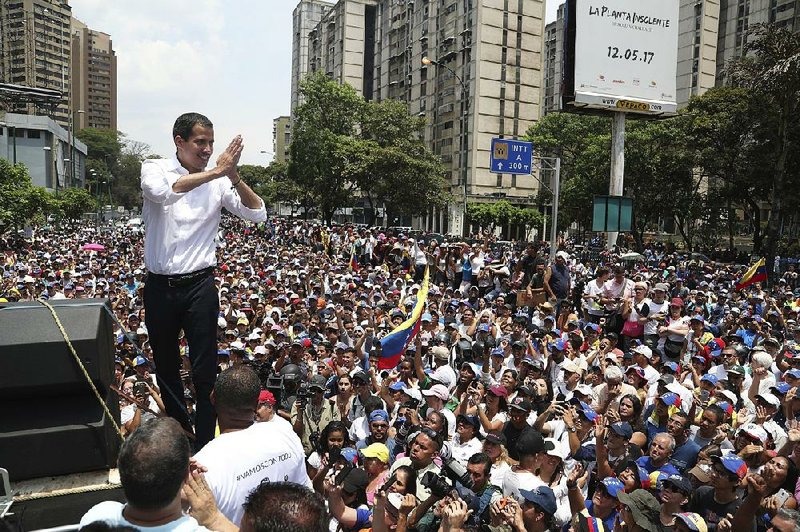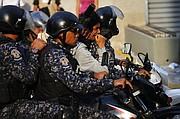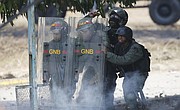CARACAS, Venezuela -- Thousands of demonstrators took to the streets in Venezuela's capital city Wednesday, responding to a call by opposition leader Juan Guaido to intensify efforts to oust the authoritarian government a day after his bid to incite a military uprising.
"If the regime thought we had reached our maximum level of pressure, they were wrong," Guaido declared to several thousand supporters in the middle-class El Marques neighborhood of eastern Caracas. "Let's keep up the pressure in the streets. The end is around the corner!"
In the Chacao business district, protesters poured into the streets holding signs calling on President Nicolas Maduro to resign. As they advanced toward the city's main highway, where the Carlota air base is located, security forces fired tear gas to disperse them. Protesters in at least two other locations in the city also were targeted with tear gas, according to reports on social media.
Ramon Machado, 22, a marketing student, said he was surprised by the size of the crowd. "I thought I was among the few who still had faith," he said. "I believe in the process, I believe in Guaido, and I can feel the change coming soon."
Guaido and President Donald Trump's administration had hoped that this week would mark a turning point in the three-month effort to remove Maduro. Guaido launched what he called the "final phase" of the operation at dawn Tuesday with a surprise appearance with troops outside the Carlota base, during which he claimed the support of key military units.
But while the head of Venezuela's domestic intelligence agency, Maj. Gen. Manuel Ricardo Cristopher Figuera, broke with the leftist president, military leaders stayed loyal to Maduro.
Now Guaido faces a heightened risk of arrest, as well as the possible withering of the most potent anti-government movement to emerge since Maduro took office in 2013. Guaido, who declared himself president in January, has been recognized as interim president by more than 50 countries, including the United States.
Carlos Romero, a Venezuelan political analyst, said it was clear that Guaido did not achieve his objective. "But we can't condemn the opposition yet," he said Wednesday. "This can be used to intensify the fight, as it was demonstrated that Maduro doesn't have complete backing from the armed forces."
Maduro denounced Tuesday's events as a failed coup. On Wednesday morning, his security forces fired tear gas at demonstrators in at least three locations in Caracas, according to accounts on Twitter. One video showed National Guardsmen in body armor blocking protesters from meeting at a plaza in the capital's El Paraiso neighborhood.
A pro-government rally next to Miraflores, the presidential palace, drew about 500 people, far fewer than the rallies of thousands of people supporting Guaido. Diosdado Cabello, one of Maduro's top lieutenants, told the rally that opposition leaders were now "walking like zombies."
Maduro appeared at the rally Wednesday afternoon, saying U.S. leaders had been fooled by the opposition into believing he was about to flee Venezuela. He said the Trump administration was part of a "pot of lies" and likened the ordeal to "fake news."
He promised to put all conspirators behind bars.
"Sooner or later they'll go to jail and pay for their betrayal and their crimes," he said.
U.S. STANCE
In Washington, the chairman of the Joint Chiefs of Staff, Gen. Joseph Dunford, told lawmakers that the unfolding situation was unclear. The Pentagon is trying to collect intelligence and "make sure we have good visibility on what is happening down in Venezuela and also be prepared to support the president should he require more from the U.S. military," he told a House appropriations subcommittee, without providing details.
Guaido's latest failure to gain support from the Venezuelan military appeared to be a setback for U.S. foreign policy. Secretary of State Mike Pompeo said U.S. officials had expected the Venezuelan president to flee the country Tuesday, but Russia had persuaded him to stay.
Maduro "had an airplane on the tarmac," Pompeo told CNN on Tuesday evening. "He was ready to leave this morning, as we understand it, and the Russians indicated he should stay" rather than go to Cuba, Pompeo said.
The U.S. government says Russia and Cuba, staunch allies of Maduro's, have essentially kept him in power as the economy of this oil-rich country collapses.
Maduro, as well as the Russian government, dismissed Pompeo's claim.
U.S. national security adviser John Bolton said Tuesday that three senior officials -- including the defense minister -- had told the opposition that they would back Maduro's ouster. But they have not broken with him.
Moscow on Wednesday accused the United States of supporting a coup attempt. In a phone call with Pompeo, Russian Foreign Minister Sergei Lavrov said Washington's "interference" constituted "a most grave violation of international law," according to a statement from the Russia Foreign Ministry.
Trump tweeted late Tuesday that the U.S. government would put a "full and complete embargo" on Cuba if its troops did not immediately end their aid to the Venezuelan government. Cuban soldiers are believed to assist Venezuelan intelligence and the armed forces.
But a top Cuban diplomat said Wednesday that Cuba has no troops in Venezuela and engages in no security operations there but maintains the right to military and intelligence cooperation with its ally.
Carlos Fernandez de Cossio, Cuba's director-general of U.S. affairs, said the U.S. is falsely accusing his country of having more than 20,000 troops and intelligence agents in Venezuela.
He said there are roughly 20,000 Cubans in Venezuela but virtually all are medical workers.
"There are no troops," he said. "Cuba does not participate in military operations nor in security operations in Venezuela."
However, broader intelligence or military cooperation would be "totally legitimate," he added.
"But what I am saying is that in spite of having that right, there are no military personnel of Cuba or troops, nor do we participate in any military or security operation as is constantly alleged," he added.
VENEZUELANS DIFFER
Venezuelans heading to work Wednesday differed on whether the tepid response to Guaido's call Tuesday would dampen support for the opposition.
"If Guaido is doing it this way, however crazy it may seem, it is because there is a plan behind it. And we have to support it," said Neidy Graterol, 31, a secretary, as she exited a Caracas metro station. "He is the only one who has achieved so much in such a short time."
She said the government was trying to intimidate opposition supporters, with police asking travelers on the metro Wednesday "where they were going and why."
Derwin Castro, a 42-year-old security guard, was considerably more frustrated. He said he initially was excited by Guaido's announcement early Tuesday that he was working with the military to remove Maduro from power.
"I said to myself, 'Finally the moment has arrived.' But later in the afternoon, when I realized they didn't have all the tanks they talked about, nor the military support, I was disappointed."
Clashes broke out across the country Tuesday between anti-government demonstrators and security forces. A 25-year-old man died, and dozens of people were injured by rubber bullets, tear gas and live ammunition, according to local observers and hospital officials. At least 119 people were detained, according to Foro Penal, an organization that tracks political detentions.
Guaido, the leader of the National Assembly, invoked the Venezuelan constitution to claim the presidency in January after Maduro declared victory in an election widely viewed as fraudulent.
On Wednesday morning, Maduro tweeted that he was ready to "confront the empire and its cronies who think they can take our victories from us; they will fail."
In a televised address the previous night, Maduro mentioned Guaido's name before announcing that prosecutors would investigate "great crimes against the constitution." He claimed that most of those military personnel who rallied to the opposition's side Tuesday quickly returned to their posts.
Yet he also announced a replacement for Figuera, chief of the feared intelligence police known as the SEBIN, a move that suggested cracks in his inner circle.
Earlier Tuesday, Figuera circulated an open letter in which he lamented Venezuela's sharp decline, saying "it would be irresponsible to blame" only the United States for this.
The oil-rich nation has been paralyzed by the political stalemate and a growing humanitarian crisis. Hyperinflation, rising crime, power failures, and shortages of medical supplies, food and water have reduced life for many to a daily struggle to survive.
Information for this article was contributed by Mariana Zuniga, Anthony Faiola, Mary Beth Sheridan, Missy Ryan, Karen DeYoung, Carol Morello and Anton Troianovski of The Washington Post; and by Scott Smith, Christopher Torchia, Christine Armario, Matthew Lee and Michael Weissenstein of The Associated Press.
A Section on 05/02/2019


